- Home
- J. D. Salinger
Raise High the Roof Beam, Carpenters & Seymour: An Introduction Page 3
Raise High the Roof Beam, Carpenters & Seymour: An Introduction Read online
Page 3
“Oh, Lord. Wouldn’t you just know?” said the Matron of Honor.
I turned around and very nearly bumped heads with her. She was leaning forward, toward and all but into the space between Mrs. Silsburn and me. Mrs. Silsburn turned toward her, too, with a responsive, rather pained expression.
“We may be here for weeks,” the Matron of Honor said, craning forward to see out of the driver’s windshield. “I should be there now. I told Muriel and her mother I’d be in one of the first cars and that I’d get up to the house in about five minutes. Oh, God! Can’t we do something?”
“I should be there, too,” Mrs. Silsburn said, rather promptly.
“Yes, but I solemnly promised her. The apartment’s gonna be loaded with all kinds of crazy aunts and uncles and absolute strangers, and I told her I’d stand guard with about ten bayonets and see that she got a little privacy and—” She broke off. “Oh, God. This is awful.”
Mrs. Silsburn gave a small, stilted laugh. “I’m afraid I’m one of the crazy aunts,” she said. Clearly, she was affronted.
The Matron of Honor looked at her. “Oh—I’m sorry. I didn’t mean you,” she said. She sat back in her seat. “I just meant that their apartment’s so tiny, and if everybody starts pouring in by the dozens—You know what I mean.”
Mrs. Silsburn said nothing, and I didn’t look at her to see just how seriously she’d been affronted by the Matron of Honor’s remark. I remember, though, that I was impressed, in a peculiar sense, with the Matron of Honor’s tone of apology for her little slip about “crazy aunts and uncles.” It had been a genuine apology, but not an embarrassed and, still better, not an obsequious one, and for a moment I had a feeling that, for all her stagy indignation and showy grit, there was something bayonetlike about her, something not altogether unadmirable. (I’ll grant, quickly and readily, that my opinion in this instance has a very limited value. I often feel a rather excessive pull toward people who don’t overapologize.) The point is, however, that right then, for the first time, a small wave of prejudice against the missing groom passed over me, a just perceptible little whitecap of censure for his unexplained absenteeism.
“Let’s see if we can get a little action around here,” the Matron of Honor’s husband said. It was rather the voice of a man who keeps calm under fire. I felt him deploying behind me, and then, abruptly, his head craned into the limited space between Mrs. Silsburn and me. “Driver,” he said peremptorily, and waited for a response. When it came with promptness, his voice became a bit more tractile, democratic: “How long do you think we’ll be tied up here?”
The driver turned around. “You got me, Mac,” he said. He faced front again. He was absorbed in what was going on at the intersection. A minute earlier, a small boy with a partly deflated red balloon had run out into the cleared, forbidden street. He had just been captured and was being dragged back to the curb by his father, who gave the boy two only partly open-handed punches between the shoulder blades. The act was righteously booed by the crowd.
“Did you see what that man did to that child?” Mrs. Silsburn demanded of everyone in general. No one answered her.
“What about asking that cop how long we’re apt to be held up here?” the Matron of Honor’s husband said to the driver. He was still leaning forward. He’d evidently not been altogether satisfied with the laconic reply to his first question. “We’re all in something of a hurry, you know. Do you think you could ask him how long we’re apt to be tied up here?”
Without turning around, the driver rudely shrugged his shoulders. But he turned off his ignition, and got out of the car, slamming the heavy limousine door behind him. He was an untidy, bullish-looking man in partial chauffeur’s livery—a black serge suit, but no cap.
He walked slowly and very independently, not to say insolently, the few steps over to the intersection, where the ranking policeman was directing things. The two then stood talking to each other for an endless amount of time. (I heard the Matron of Honor give a groan, behind me.) Then, suddenly, the two men broke into uproarious laughter—as though they hadn’t really been conversing at all but had been exchanging very short dirty jokes. Then our driver, still laughing uninfectiously, waved a fraternal hand at the cop and walked—slowly—back to the car. He got in, slammed his door shut, extracted a cigarette from a package on the ledge over the dashboard, tucked the cigarette behind his ear, and then, and then only, turned around to make his report to us. “He don’t know,” he said. “We gotta wait for the parade to pass by here.” He gave us, collectively, an indifferent once-over. “After that we can go ahead O.K.” He faced front, disengaged the cigarette from behind his ear, and lit it.
In the back of the car, the Matron of Honor sounded a voluminous little plaint of frustration and pique. And then there was silence. For the first time in several minutes, I glanced around at the tiny elderly man with the unlighted cigar. The delay didn’t seem to affect him. His standard of comportment for sitting in the rear seat of cars—cars in motion, cars stationary, and even, one couldn’t help imagining, cars that were driven off bridges into rivers—seemed to be fixed. It was wonderfully simple. You just sat very erect, maintaining a clearance of four or five inches between your top hat and the roof, and you stared ferociously ahead at the windshield. If Death—who was out there all the time, possibly sitting on the hood—if Death stepped miraculously through the glass and came in after you, in all probability you just got up and went along with him, ferociously but quietly. Chances were, you could take your cigar with you, if it was a clear Havana.
“What are we going to do? Just sit here?” the Matron of Honor said. “I’m so hot I could die,” And Mrs. Silsburn and I turned around just in time to see her look at her husband directly for the first time since they’d got into the car. “Can’t you move over just a tiny little bit?” she said to him. “I’m so squashed in here I can hardly breathe.”
The Lieutenant, chuckling, opened his hands expressively. “I’m practically sitting on the fender now, Bunny,” he said.
The Matron of Honor then looked over, with mixed curiosity and disapproval, at her other seatmate, who, as though unconsciously dedicated to cheering me up, was occupying far more space than he needed. There was a good two inches between his right hip and the base of the outside armrest. The Matron of Honor undoubtedly noticed it, too, but, for all her metal, she didn’t quite have what it would have taken to speak up to that formidable-looking little personage. She turned back to her husband. “Can you reach your cigarettes?” she said irritably. “I’ll never get mine out, the way we’re packed in here.” With the words “packed in,” she turned her head again to shoot a brief, all-implicit look at the tiny guilty party who had usurped the space she thought ought rightfully to be hers. He remained sublimely out of touch. He went on glaring straight ahead of him, toward the driver’s windshield. The Matron of Honor looked at Mrs. Silsburn, and raised her eyebrows expressively. Mrs. Silsburn responded with a countenance full of understanding and sympathy. The Lieutenant, meanwhile, had shifted his weight over to his left, or window-side, buttock, and from the right-hand pocket of his officer’s pinks had taken out a package of cigarettes and a folder of matches. His wife picked out a cigarette, and waited for a light, which was immediately forthcoming. Mrs. Silsburn and I watched the lighting of the cigarette as though it were a moderately bewitching novelty.
“Oh, pardon me,” the Lieutenant suddenly said, and extended his cigarette pack to Mrs. Silsburn.
“No, thank you. I don’t smoke,” Mrs. Silsburn said quickly—almost with regret.
“Soldier?” the Lieutenant said, extending the pack to me, after the most imperceptible of hesitations. In all truth, I rather liked him for putting through the offer, for the small victory of common courtesy over caste, but I declined the cigarette.
“May I see your matches?” Mrs. Silsburn said, in an exceedingly diffident, almost little-girlish voice.
“These?” said the Lieutenant. He h
anded his folder of matches readily over to Mrs. Silsburn.
While I looked on with an expression of absorption, Mrs. Silsburn examined the match folder. On its outside cover, in gold letters on a crimson background, were printed the words “These Matches Were Stolen from Bob and Edie Burwick’s House.” “Darling,” Mrs. Silsburn said, shaking her head. “Really darling.” I tried to show by my expression that I perhaps couldn’t read the inscription without eyeglasses; I squinted, neutrally. Mrs. Silsburn seemed reluctant to hand the folder back to its owner. When she had, and the Lieutenant had replaced the folder in the breast pocket of his tunic, she said, “I don’t think I’ve ever seen that before.” Turned almost completely around, now, in her jump seat, she sat gazing rather fondly at the Lieutenant’s breast pocket.
“We had a whole bunch of them made up last year,” the Lieutenant said. “Be amazed, actually, how it keeps you from running out of matches.”
The Matron of Honor turned to him—or, rather, on him. “We didn’t do it for that,” she said. She gave Mrs. Silsburn a you-know-how-men-are look, and said to her, “I don’t know. I just thought it was cute. Corny, but sort of cute. You know.”
“It’s darling. I don’t think I’ve ever—”
“Actually, it isn’t original or anything like that. Everybody’s got them now,” the Matron of Honor said. “Where I got the idea originally, as a matter of fact, was from Muriel’s mother and dad. They always had them around the house.” She inhaled deeply on her cigarette, and as she went on talking, she released the smoke in little syllabic drafts. “Golly, they’re terrific people. That’s what kills me about this whole business. I mean why doesn’t something like this happen to all the stinkers in the world, instead of the nice ones? That’s what I can’t understand.” She looked to Mrs. Silsburn for an answer.
Mrs. Silsburn smiled a smile that was at once worldly, wan, and enigmatic—the smile, as I remember, of a sort of jump-seat Mona Lisa. “I’ve often wondered,” she mused softly. She then mentioned, rather ambiguously, “Muriel’s mother is my late husband’s baby sister, you know.”
“Oh!” the Matron of Honor said with interest. “Well, then, you know.” She reached out an extraordinarily long left arm, and flicked her cigarette ashes into the ashtray near her husband’s window. “I honestly think she’s one of the few really brilliant people I’ve met in my entire life. I mean she’s read just about everything that’s ever been printed. My gosh, if I’d just read about one-tenth of what that woman’s read and forgotten, I’d be happy. I mean she’s taught, she’s worked on a newspaper, she designs her own clothes, she does every single bit of her own housework. Her cooking’s out of this world. Golly! I honestly think she’s the most wonder—”
“Did she approve of the marriage?” Mrs. Silsburn interrupted. “I mean the reason I ask, I’ve been in Detroit for weeks and weeks. My sister-in-law suddenly passed away, and I’ve—”
“She’s too nice to say,” the Matron of Honor said flatly. She shook her head. “I mean she’s too—you know—discreet and all.” She reflected. “As a matter of fact, this morning’s about the only time I ever heard her say boo on the subject, really. And then it was only just because she was so upset about poor Muriel.” She reached out an arm and tipped her cigarette ashes again.
“What’d she say this morning?” Mrs. Silsburn asked avidly.
The Matron of Honor seemed to reflect for a moment. “Well, nothing very much, really,” she said. “I mean nothing small or really derogatory or anything like that. All she said, really, was that this Seymour, in her opinion, was a latent homosexual and that he was basically afraid of marriage. I mean she didn’t say it nasty or anything. She just said it—you know—intelligently. I mean she was psychoanalyzed herself for years and years.” The Matron of Honor looked at Mrs. Silsburn. “That’s no secret or anything. I mean Mrs. Fedder’ll tell you that herself, so I’m not giving away any secret or anything.”
“I know that,” Mrs. Silsburn said quickly. “She’s the last person in the—”
“I mean the point is,” the Matron of Honor said, “she isn’t the kind of person that comes right out and says something like that unless she knows what she’s talking about. And she never, never would’ve said it in the first place if poor Muriel hadn’t been so—you know—so prostrate and everything.” She shook her head grimly. “Golly, you should’ve seen that poor kid.”
I should, no doubt, break in here to describe my general reaction to the main import of what the Matron of Honor was saying. I’d just as soon let it go, though, for the moment, if the reader will bear with me.
“What else did she say?” Mrs. Silsburn asked. “Rhea, I mean. Did she say anything else?” I didn’t look at her—I couldn’t take my eyes off the Matron of Honor’s face—but I had a passing, wild impression that Mrs. Silsburn was all but sitting in the main speaker’s lap.
“No. Not really. Hardly anything.” The Matron of Honor, reflecting, shook her head. “I mean, as I say, she wouldn’t have said anything—with people standing around and all—if poor Muriel hadn’t been so crazy upset.” She flicked her cigarette ashes again. “About the only other thing she said was that this Seymour was a really schizoid personality and that, if you really looked at it the right way, it was really better for Muriel that things turned out the way they did. Which makes sense to me, but I’m not so sure it does to Muriel. He’s got her so buffaloed that she doesn’t know whether she’s coming or going. That’s what makes me so—”
She was interrupted at that point. By me. As I remember, my voice was unsteady, as it invariably is when I’m vastly upset.
“What brought Mrs. Fedder to the conclusion that Seymour is a latent homosexual and a schizoid personality?”
All eyes—all searchlights, it seemed—the Matron of Honor’s, Mrs. Silsburn’s, even the Lieutenant’s, were abruptly trained on me. “What?” the Matron of Honor said to me, sharply, faintly hostilely. And again I had a passing, abrasive notion that she knew I was Seymour’s brother.
“What makes Mrs. Fedder think that Seymour’s a latent homosexual and schizoid personality?”
The Matron of Honor stared at me, then gave an eloquent snort. She turned and appealed to Mrs. Silsburn with a maximum of irony. “Would you say that somebody’s normal that pulled a stunt like the one today?” She raised her eyebrows, and waited. “Would you?” she asked quietly-quietly. “Be honest. I’m just asking. For this gentleman’s benefit.”
Mrs. Silsburn’s answer was gentleness itself, fairness itself. “No, I certainly would not,” she said.
I had a sudden, violent impulse to jump out of the car and break into a sprint, in any direction at all. As I remember, though, I was still in my jump seat when the Matron of Honor addressed me again. “Look,” she said, in the spuriously patient tone of voice that a teacher might take with a child who is not only retarded but whose nose is forever running unattractively. “I don’t know how much you know about people. But what man in his right mind, the night before he’s supposed to get married, keeps his fiancé up all night blabbing to her all about how he’s too happy to get married and that she’ll have to postpone the wedding till he feels steadier or he won’t be able to come to it? Then, when his fiancée explains to him like a child that everything’s been arranged and planned out for months, and that her father’s gone to incredible expense and trouble and all to have a reception and everything like that, and that her relatives and friends are coming from all over the country—then, after she explains all that, he says to her he’s terribly sorry but he can’t get married till he feels less happy or some crazy thing! Use your head, now, if you don’t mind. Does that sound like somebody normal? Does that sound like somebody in their right mind?” Her voice was now shrill. “Or does that sound like somebody that should be stuck in some booby hatch?” She looked at me very severely, and when I didn’t immediately speak up in either defense or surrender, she sat heavily back in her seat, and said to her husban
d, “Give me another cigarette, please. This thing’s gonna burn me.” She handed him her burning stub, and he extinguished it for her. He then took out his cigarette package again. “You light it,” she said. “I haven’t got the energy.”
Mrs. Silsburn cleared her throat. “It sounds to me,” she said, “like a blessing in disguise that everything’s turned—”
“I ask you,” the Matron of Honor said to her with a fresh impetus, at the same time accepting a freshly lighted cigarette from her husband. “Does that sound like a normal person—a normal man—to you? Or does it sound like somebody that’s either never grown up or is just an absolute raving maniac of some crazy kind?”
“Goodness. I don’t know what to say, really. It just sounds to me like a blessing in disguise that every—”
The Matron of Honor sat forward suddenly, alertly, exhaling smoke through her nostrils. “All right, never mind that, drop that for a minute—I don’t need that,” she said. She was addressing Mrs. Silsburn, but in actuality she was addressing me through Mrs. Silsburn’s face, so to speak.
“Did you ever see —— ——, in the movies?” she demanded.
The name she mentioned was the professional name of a then fairly well-known—and now, in 1955, a quite famous—actress-singer.
“Yes,” said Mrs. Silsburn quickly and interestedly, and waited.
The Matron of Honor nodded. “All right,” she said. “Did you ever notice, by any chance, how she smiles sort of crooked? Only on one side of her face, sort of? It’s very noticeable if you—”
“Yes—yes, I have!” Mrs. Silsburn said.
The Matron of Honor dragged on her cigarette, and glanced over—just perceptibly—at me. “Well, that happens to be a partial paralysis of some kind,” she said, exhaling a little gust of smoke with each word. “And do you know how she got it? This normal Seymour person apparently hit her and she had nine stitches taken in her face.” She reached over (in lieu, possibly, of a better stage direction) and flicked her ashes again.

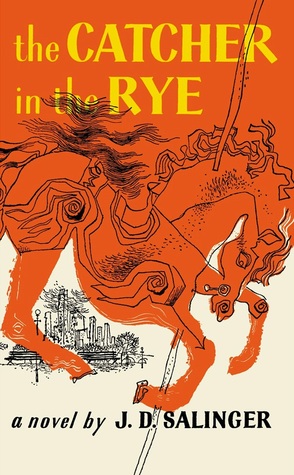 Catcher in the Rye
Catcher in the Rye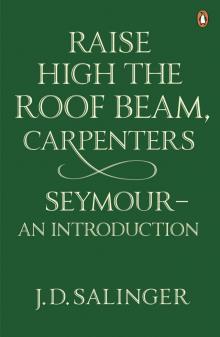 Raise High the Roof Beam, Carpenters & Seymour: An Introduction
Raise High the Roof Beam, Carpenters & Seymour: An Introduction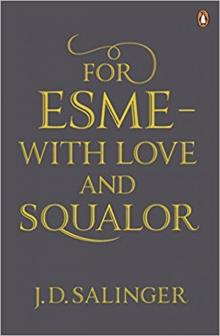 For Esmé, With Love and Squalor
For Esmé, With Love and Squalor Nine Stories
Nine Stories Franny and Zooey
Franny and Zooey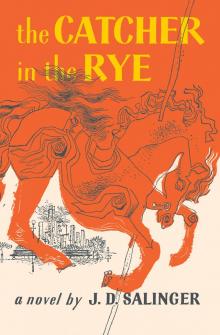 The Catcher in the Rye
The Catcher in the Rye Three Stories
Three Stories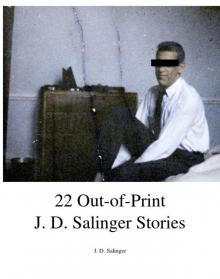 22 Out-of-print J. D. Salinger Stories
22 Out-of-print J. D. Salinger Stories